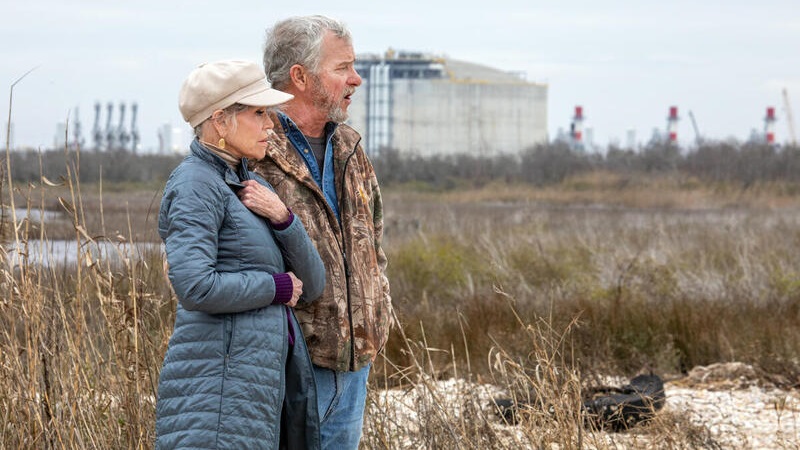The US government is halting decisions over further expanding its gas exports until it can apply updated climate considerations to projects seeking new approvals.
Announcing the move on Friday morning, President Joe Biden said the pause on all pending export permits for liquified natural gas (LNG) “sees the climate crisis for what it is: the existential threat of our time”.
The decision comes after Biden faced mounting pressure from environmentalists and climate activists to apply the brakes on the US build-up of fossil fuel capacity. The groups represent an important voter base for Biden as he seeks reelection in November.
The US is the world’s largest exporter of LNG and shipments are expected to keep soaring as a result of projects already approved and under construction.
But the review will put on hold the planned development of at least four more gas export terminals on the coast of the Gulf of Mexico.
That includes the Calcasieu Pass 2 (or CP2), a facility in Louisiana described by campaigners as a “carbon bomb”. If built, it could ship up to 24 million tonnes of gas every year.
New climate tests
Biden said his administration “will take a hard look at the impacts of LNG exports on energy costs, America’s energy security and our environment”.
A White House statement said the pause would allow the White House to integrate “critical considerations” that have emerged since the last analysis of gas export approvals was carried out five years ago.
That includes the impact of greenhouse gas emissions. Gas supporters have historically promoted it as a “cleaner” fossil fuel because of its reduced carbon dioxide emissions compared to coal.
But LNG is primarily made of methane, a much more potent earth-warming gas. While burning it turns it into carbon dioxide, methane leaks during transport can push its lifetime emissions higher than those of coal, according to a new study by methane expert Robert Howarth currently undergoing peer review.
Max Gruenig, senior policy advisor at E3G, said Biden’s decision is a “significant shift” because the Department of Energy, which is responsible for assessing the projects, has historically only taken economic benefits into account.
“They will have to come up with a new methodology to assess what is beneficial to the public that includes externalities like climate change”, he added. “But the problem is, of course, as soon as you publish the details of the methodology, you risk being litigated against and attacked in court. The pause allows the Biden administration to avoid this and buy itself more time until the election”.
Elections in sight
Campaigners hailed the White House announcement as a “bold step” and “a historic win”. Ben Jealous, executive director of the Sierra Club, said the decisions “makes it clear that the Biden administration is listening to the calls to break America’s reliance on dirty fossil fuels and secure a livable future for us all”.
Sixty percent of US voters surveyed in a poll by Data for Progress, a progressive think tank last November supported limiting gas exports.
Gruenig said that the Biden administration had been “growing more careful” about climate considerations in energy infrastructure after approving the Willow oil project in Alaska. “I don’t think the White House expected that would cause such a massive backlash from the climate community”, he added.
Zimbabwe looks to China to secure a place in the EV battery supply chain
Biden’s statement attempts to draw a dividing line with his likely opponent Donald Trump. He criticised “MAGA [Make America Great Again] Republicans” who “willfully deny the urgency of the climate crisis, condemning the American people to a dangerous future”.
Gruenig believes the LNG expansion freeze will bolster US credibility on the international climate stage, where many developing countries and campaigners regularly point fingers at American hypocrisy over fossil fuel investments.
Lobbyists fan energy security fears
Industry groups have condemned the pause as a “win for Russia” and “a loss for American allies”. As rumors of Biden’s plans swirled around in previous days, the prevailing narrative from pro-gas lobbyists has been that the approvals freeze would put Europe’s future energy security at risk.
Since Russia’s invasion of Ukraine forced the bloc to look for alternative gas sources, US LNG exports to Europe have increased rapidly.
But analysts believe this is going to change soon as a result of rapid renewables rollout and better energy efficiency. By 2026, the International Energy Agency (IEA) predicts European gas demand will be one-fifth below the pre-war level of 2021.
Cop29 host Azerbaijan launches green energy unit to sceptical response
Existing LNG installations should be able to satisfy that demand without any further expansion, according to IEEFA. Their analyst say that, just taking into account terminals already being built, US export capacity by the end of this decade will be three-quarters higher than European demand.
A group of 60 European lawmakers largely from Green parties made that point in a letter to the White House on Thursday, arguing that the fossil fuel industry is using Europe as “an excuse” to expand gas exports. “The demand for new gas from industry voices in Europe is a false one”, they said.
While using pro-Europe rhetoric, gas producers could actually be looking to sell their products in other, more promising markets. Venture Global, the owner of the CP2 terminal in Lousiana, has signed purchase agreements with Japan and China, for example.

